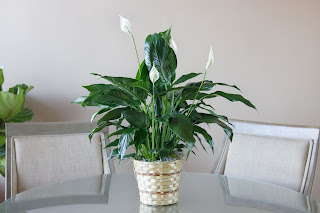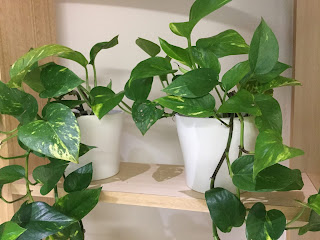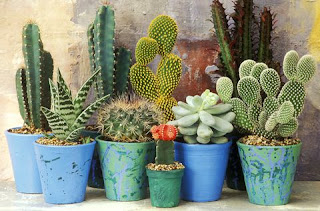Some plants provide more benefits than others, and maintenance levels vary widely between species. Small potted plants have all the benefits of large plants, but on a smaller scale. If an office contains a large number of small plants, the benefits will be just as obvious as if the office had one or two large plants instead.
Peace lilies
The Peace Lily is a beautiful plant and one that can improve your indoor air quality by as much as 60 percent. A peace lily with blooming white bulbs is truly a sight to behold, especially when several peace lilies of varying sizes decorate different parts of the office. Peace lilies do require some nurturing to thrive, but they are still considered a low-maintenance plant.
Heartleaf philodendron
Heartleaf philodendrons remain small when frequently cut back, so most offices place them on desks and other surfaces with limited space. Larger areas are usually reserved for plants that require more room.
Devil’s ivy
The most important benefit of Epipremnum aureum is that it is quite efficient at cleansing the air of pollutants. To give these active office plants room to grow, suspend them in a hanging basket or place them on ledges.
Cactus plant
The office cactus plant can be a great plant for individual desks keeping a small robust plant around your personal desk space is a good start to enriching your office space and purifying their air and others might also buy their own little plants and you could start the new office trend in greenery. Cactus plants are known for their hardy nature and require little watering, but they will need to be near sunlight – yet not in direct sunlight.
Bamboo plant
It also grows incredibly densely, absorbs up to 5x the amount of CO2, and produces 35% more Oxygen than other plants in the samImage result for bamboo plant amount of space, which helps decrease the amount of greenhouse gases released into the atmosphereOnce potted correctly with satisfactory drainage, pebble based pots will grow really well. If you have a larger communal space, these are perfect. Place them near indirect sunlight and away from air conditioners and heating sources. They thrive on filtered water as the chlorine in regular tap water can damage them..
Areca palm
Considered the most efficient natural air humidifier available, Areca palms keep offices pleasantly humidified and work hard to remove airborne toxins. ome offices even use Areca palms instead of conventional electric humidifiers. Offices that have room to spare frequently invest in small potted trees. Most office trees stay small enough to thrive comfortably in areas with limited space. While trees generally cost more than smaller office plants, no office plant outperforms trees when it comes to keeping temperatures comfortable and cutting back on pollution.
Ficus
The ficus variety is the most popular type of office tree. Ficus trees lose their leaves as a warning sign of stress. While this is sometimes messy, it is a clear sign that it needs maintenance. You might even consider a small fruit tree for a bit of fun.
The benefits of office plants go far beyond reducing stress and noise levels.
The benefits of office plants go far beyond reducing stress and noise levels.
-
Offices with an abundance of plants improve employee health by significantly reducing the levels of airborne bacteria. In fact, statistics show that employees who work in offices that do not have many plants use more sick days than employees who work in offices that do.
-
Office plants also play an important role in relieving dust and mold allergies. Their leaves and soil naturally collect the dust and mould particles that would otherwise float freely through the air. Employees who suffer from allergies at work can also suffer from a weakened immune system and lower productivity.
-
Plants cool office air, saving a significant amount of money and energy by reducing the workload on air conditioning units. So environmentally conscious offices keep a variety of live plants to cut down on indoor pollution and energy use. (Offices that do not typically focus on green living capitalize on these financial benefits, too.)
-
The water evaporating from the leaves of office plants creates a humidity level that office workers find very comfortable. Without plants, office air is not humid enough. Low humidity levels damage expensive materials such as wood.
In spite of their differences, all office plants cut back on energy usage and contribute to the overall health of an office space.
7 Great Plants For Your Office








Nice Post! Thanks for sharing such an amazing article, really informative,it helps me a lot. Are you looking for a Top interior designers in Hyderabad then please visit: Top interior designers in Hyderabad